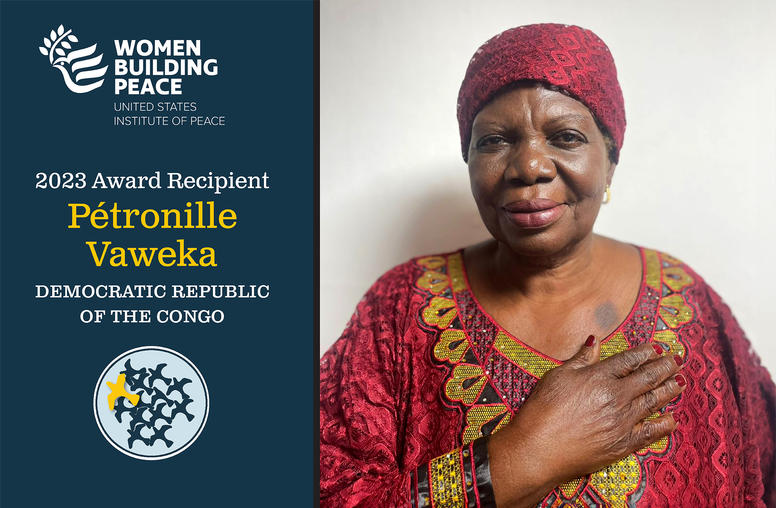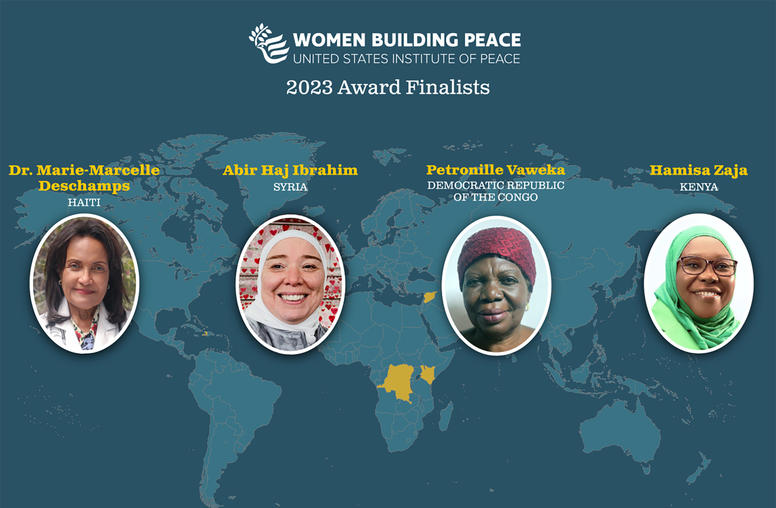Hatred, Violence, and the Work of The United States Institute of Peace
A special statement by Institute Board Chair Chester Crocker and Institute President Richard Solomon.
September 11, 2001, like December 7, 1941, marks a day that transformed in a fundamental way the thinking of the American people -- indeed people around the world -- about their security and the nature of international conflict. A new sense of national vulnerability emerged from the attacks on the World Trade Center and the Pentagon, and from it recognition that long-established approaches to national defense are out of sorts with the threats of the post-Cold War world. Our institutions and policies -- our thinking -- have not come to grips with how to defend against those who perpetrate acts of mass violence justified by religious belief.
Along with the shock and horror of the events of September 11, however, have come an upwelling of patriotism and sense of common purpose -- and the gradual realization that out of this disaster can come the opportunity to remake our defenses and deal with international conflicts with broadened international support.
We here at the Institute, along with our compatriots and friends around the world, have reacted with stunned disbelief, grief, and then anger at the terrorists' attacks on our people, our critical national institutions, and the physical symbols of America's economic and military strength. Yet we have been uplifted by the outpouring of public spirit and the collective desire to help that is enabling the American people to commit their anger and grief to a constructive response. Everyone we know is seeking ways to contribute to a process of national recovery and healing, and to support an effective response to the perpetrators of the heinous attacks on Washington and New York.
The Institute is fortunate, in this time of tragedy and challenge, to be able to draw from its work in support of our nation's response to this era-defining event. Our ability to contribute is magnified by the considered recognition of our national leaders that terrorism, at its core, is a political form of warfare. Our response must be measured, political, systematic, and long-term in character even as military power will have a critical role to play in dealing with this challenge to our national security. The President and other members of his administration have told us that an effective response to the events of September 11 requires complex and persistent action by a broad coalition of countries that share common values and a common vulnerability to the threat of terrorism.
Thus, out of this terrible violence is emerging recognition that we -- both our country and the Institute -- have an important opportunity to mobilize domestic and international support for dealing with long-standing conflicts that are manipulated by political factions who use terror, justified by a religious belief or a political agenda, to pursue self-serving ends. Our national challenge is to understand the causes and dynamics of these events and to creatively rethink more effective ways to deal with international conflict and approaches to ensuring our security in the still-violent world of the 21st Century.
In support of this national endeavor, and within the limits of our resources and current programming, the Institute of Peace will seek additional funding to expand activities in the following areas:
- Developing Effective Responses to Terrorism. The Institute, as a founding member of the International Research Group on Political Violence, has supported for the past five years nearly two dozen research projects on the character and dynamics of terrorism. Drawing on this work, and the contributions of the highly experienced members of the Political Violence Research Group, we will work with the Administration to develop effective strategies for dealing with this new level of the terrorist threat to our national security and that of allied and friendly states. The Institute will also use its grant and fellowship resources to advance the understanding of political violence and ways of dealing with it.
- A Special Initiative on Middle East Conflicts. The range of countries from Northern Africa, through the Israeli-Palestinian conflict, to Iraq and Afghanistan, is the context of much of the instability in today's world, if not the source of the September 11 attacks. The Institute will draw on a broad array of work on issues related to this region to promote more effective policies and to address, in particular, options for political action. This would include establishment of a Middle East Working Group (similar to our Balkans Working Group) composed of analysts, NGO representatives, and government personnel. This effort will draw heavily on the Institute's network of relationships with former practitioners, private sector analysts and scholars, former fellows, and grantees throughout the region developed over the past 15 years, especially during the Special Middle East Program conducted in the early 1990s during the Gulf War.
In addition to the work described above, the range of activities we will promote include the following (which we have used previously both in the Middle East, the Balkans, and other regions):
- Develop "track two" outreach programs critical to international coalition building. The Institute will work with counterpart institutions in key countries to seek to develop common policy perspectives that will reinforce the Administration's efforts to build a broad international coalition, and in a way that supports America's democratic values and tradition of tolerance and religious freedom. In addition to friendly countries in the Middle East, the countries may include Russia, China, and allied states in Europe.
- Facilitation of dialogues among groups in conflict (such as previously conducted regarding Israel and the Palestinian Authority, Kosovo, Kashmir, and Sudan).
- Processes of reconciliation, including promoting the rule of law and human rights, and providing conflict management training for local officials and others.
- Working with educators in zones of conflict to promote the incorporation of conflict management and resolution into the teaching of students at secondary and undergraduate levels.
- Develop "track two" outreach programs critical to international coalition building. The Institute will work with counterpart institutions in key countries to seek to develop common policy perspectives that will reinforce the Administration's efforts to build a broad international coalition, and in a way that supports America's democratic values and tradition of tolerance and religious freedom. In addition to friendly countries in the Middle East, the countries may include Russia, China, and allied states in Europe.
- Facilitating Inter-religious Dialogues. Taking advantage of more than a decade of work on religion and conflict, the Institute will bring together religious leaders from different faiths to review ways that religious beliefs are exploited to build political support in the Islamic world for terrorist activities. This effort will assess strategies for differentiating U.S. opposition to terrorism from tolerance and respect for Islam.
The Institute will explore possibilities for interfaith dialogues as an approach to promoting peace and reconciliation (as it did following the Gulf War and has been ready to do in the current Israeli-Palestinian situation). The Institute has significant experience in convening groups in conflict (as it has done regarding Kosovar Serbs and Albanians and others). Such efforts need careful planning and sufficient funds to support a sustained series of dialogues managed by experienced, expert, and credible personnel.
- Teaching American Young People about Terrorism. The Institute will work with American educators to address how teachers should approach presenting these recent events and the many issues surrounding them to their students. This would include consultation with experts for different age groups, including young children in lower and middle-school grades, plus secondary and undergraduate levels. The Institute will develop materials for use in the classroom at these various educational levels.
- Awarding Fellowships and Grants Focused on Terrorism and Political Violence. Applying an accelerated review process, the Institute will provide support via fellowships and grants to experts with both practical and academic experience in areas of immediate need. These awards might include Institute Executive Fellows who would work in the Executive Branch for a period of a year or so and then come to the Institute to review and analyze their experiences. This will augment White House, State Department, and Defense Department expertise with immediate in-depth expertise from outside the government. The Institute will also add a solicited grant topic and will focus some of its fellowship awards to support study of the patterns, rise and fall, and sequential behavior cycles of terrorist actors and their actions and to examine what sorts of policy measures and political environments appear to influence terrorist activity.
|
spacer |
||
|
Chester A. Crocker |
Richard H. Solomon |
|
|
Chairman of the Board |
President |
|
|
United States Institute of Peace |
United States Institute of Peace |
|
|
|
Established as a bipartisan initiative in 1984, the United States Institute of Peace was founded by an act of Congress and signed into law by President Ronald Reagan. An independent, nonpartisan federal institution, the Institute is funded through annual appropriations by Congress with a mandate to strengthen the nation's capacity to promote the peaceful resolution of international conflict. The Institute is governed by a 15-member, bipartisan Board of Directors appointed by the President of the United States.


